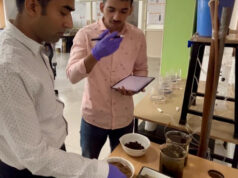Baddi — In a groundbreaking development, an innovative technology has been unveiled that converts the harmful smoke emitted from cigarettes, cigars, beedis, and hookahs into organic fertilizer. This revolutionary solution, developed by a Baddi-based company Bunkerman, addresses the dual challenges of indoor air pollution and waste management in smoking rooms across five-star hotels and airports in India.
Revolutionary Technology for a Healthier Environment
The technology utilizes specialized filters designed to absorb the toxic gases and substances present in cigarette smoke. Common pollutants such as carbon dioxide (CO₂), carbon monoxide (CO), formaldehyde, nitrogen dioxide (NO₂), benzene, and particulate matter (PM 2.5 and PM 10) are efficiently captured and neutralized by these filters.
Understanding the Harmful Effects of Cigarette Smoke
Cigarette smoke is a well-documented health hazard. The harmful substances it releases include:
- Carbon Monoxide (CO): Reduces the blood’s ability to carry oxygen, leading to cardiovascular problems.
- Formaldehyde: A known carcinogen that can cause respiratory issues and skin irritation.
- Nitrogen Dioxide (NO₂): Contributes to respiratory problems and can exacerbate conditions like asthma.
- Benzene: Another carcinogen, linked to leukemia and other blood disorders.
- Particulate Matter (PM 2.5 and PM 10): Can penetrate deep into the lungs, causing inflammation and exacerbating respiratory diseases.
These pollutants not only pose significant risks to active smokers but also harm non-smokers through second-hand smoke exposure. Furthermore, they contribute to environmental pollution, affecting air quality and overall public health.
Successful Testing in Specialized Laboratories
Major General Dr. Shripal (Retd.), the chairman overseeing the project, recently conducted successful tests of these innovative filters in a specially designed laboratory at the company’s factory. During the demonstration, Dr. Shripal showcased how the filters effectively absorb the hazardous gases produced in a smoke chamber. The captured pollutants are then processed and converted into mineral-rich organic manure, which can be used as a fertilizer for trees and plants.
Meeting Demand in High-Profile Locations
The development of this technology was driven by specific requests from smoking rooms in some of the country’s leading five-star hotels and airports. These environments often struggle with the accumulation of harmful substances from cigarette smoke, posing health risks to patrons and contributing to environmental pollution. This solution not only mitigates these risks but also provides a sustainable byproduct in the form of organic fertilizer.
A Win-Win for Health and Sustainability
The introduction of these filters is poised to make a significant impact on public health and environmental sustainability. By transforming toxic smoke into beneficial organic manure, the technology offers a unique way to reduce pollution and promote greener practices. This innovation reflects a broader commitment to finding sustainable solutions to modern environmental challenges.
Future Prospects and Expansion
With successful tests completed, there are plans to expand the deployment of these filters across more hotels and airports, potentially reaching other public and private establishments where smoking rooms are prevalent. This breakthrough technology could pave the way for further innovations in waste-to-resource conversion, contributing to a healthier and more sustainable future.
Addressing the Broader Impact of Smoke Pollution
The adverse effects of cigarette smoke extend far beyond the confines of smoking rooms. Outdoor cigarette smoke contributes to air pollution, impacting not just smokers but everyone exposed to it. According to the World Health Organization (WHO), tobacco smoke contains over 7,000 chemicals, of which at least 250 are known to be harmful and more than 50 are known to cause cancer. The innovative filters not only aim to reduce these harmful effects in enclosed spaces but also set a precedent for tackling larger environmental issues.
By transforming toxic smoke into organic fertilizer, this technology could revolutionize how we manage cigarette waste, offering a sustainable and health-conscious solution to a pervasive problem. As these filters become more widespread, they hold the promise of significantly reducing the health risks associated with cigarette smoke and contributing to a greener planet.












